ㅁ some ravens, strolling, down along the rocky beach, stopped to look at me
– a pseudo-haiku.
This tree is a guest tree from my past. I took this picture in April, 2011, at the rural public school where I worked, in Yeonggwang County, South Korea.
This tree supervised an eagle that was out sitting on a pillar in the sea.
ㅁ It seems that the key is to time it precisely: enlightened at death. It would be easy: approximate asymptote, like Zeno's story. Perhaps many folks succeed in this task. Indeed... maybe all do it.
– three pseudo-haiku as stanzas in a longer poem.
This tree supervised an industrial area in Ketchikan.
We traveled all day and arrived in Cherry Grove, Oregon, late at night.
![]() [daily log: walking, 6km; traveling (cars, boats, planes, cars), 1312km]
[daily log: walking, 6km; traveling (cars, boats, planes, cars), 1312km]
This tree is in neighbors Mike and Penny’s yard. It looked like it was about to be blown away by strong winds this morning.
ㅁ Some days, you're a dog. Other days, you're just some grass growing by the road.
– a pseudo-haiku.
This tree was among others of its kind, across the street from where I was working in October, 2012, along Ilsan-no (Ilsan Road), in South Korea. This neighborhood was my “home” (where I worked) for 9 out of the 11 years I was in Korea.
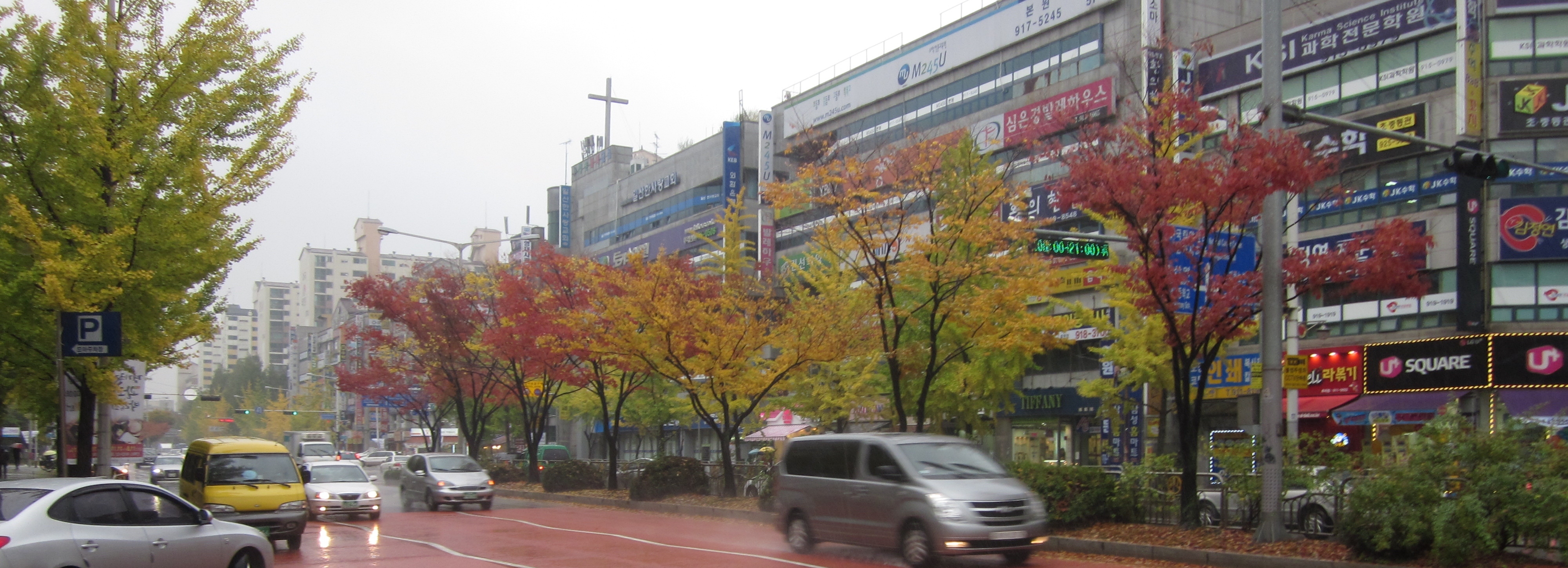
This tree was in the sea.
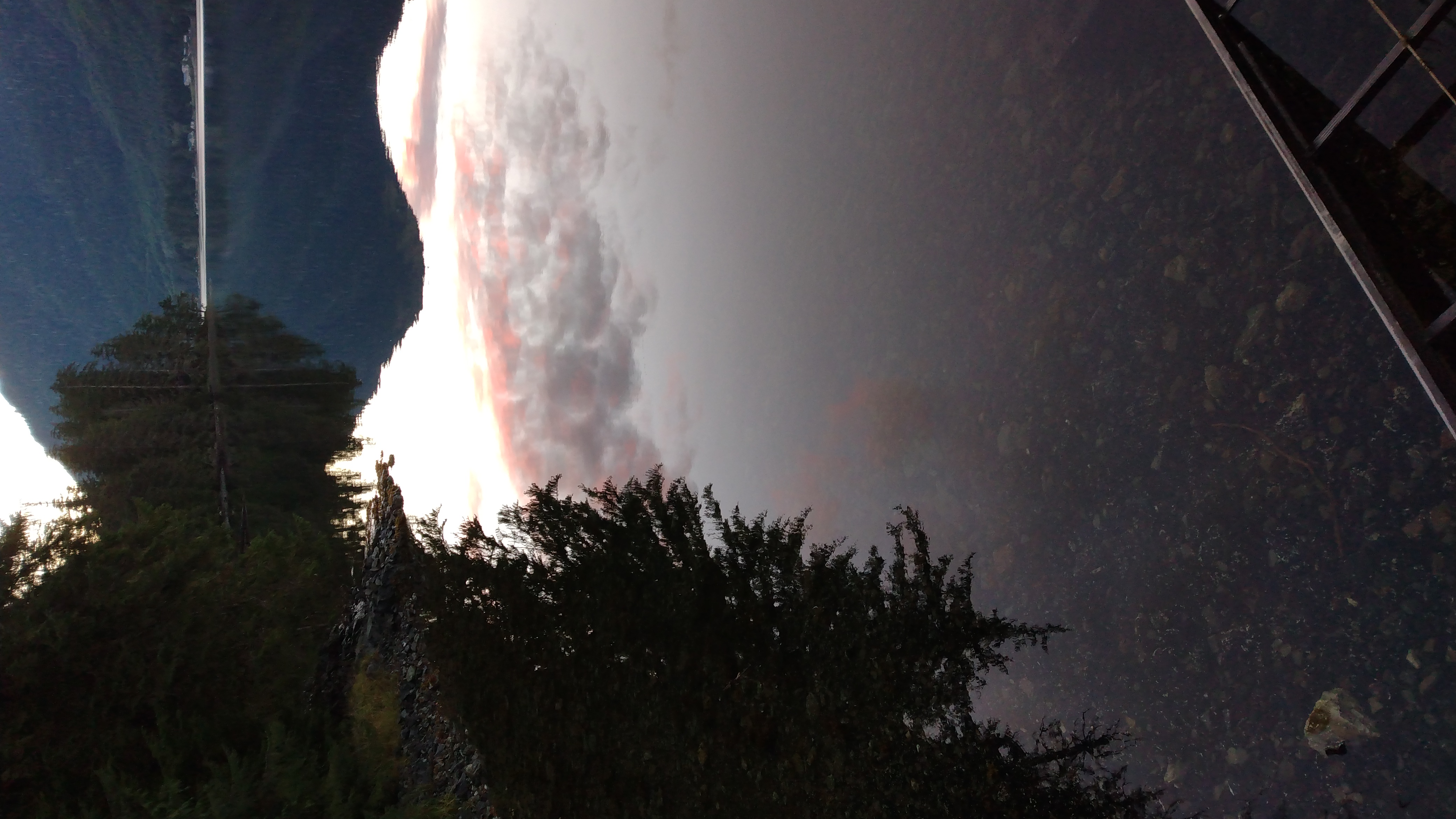
Some customers came into the store today, as they will do. Trying to be friendly, and seeing they were likely out-of-towners, I asked, “So, are you up fishing? Hunting?”
This one customer was a smart-alec. He answered, smooth as can be, “No, actually. I’m up here to visit gift shops. I’ll do a little fishing on the side if I have time.”
This tree saw the clouds part – but that was yesterday.
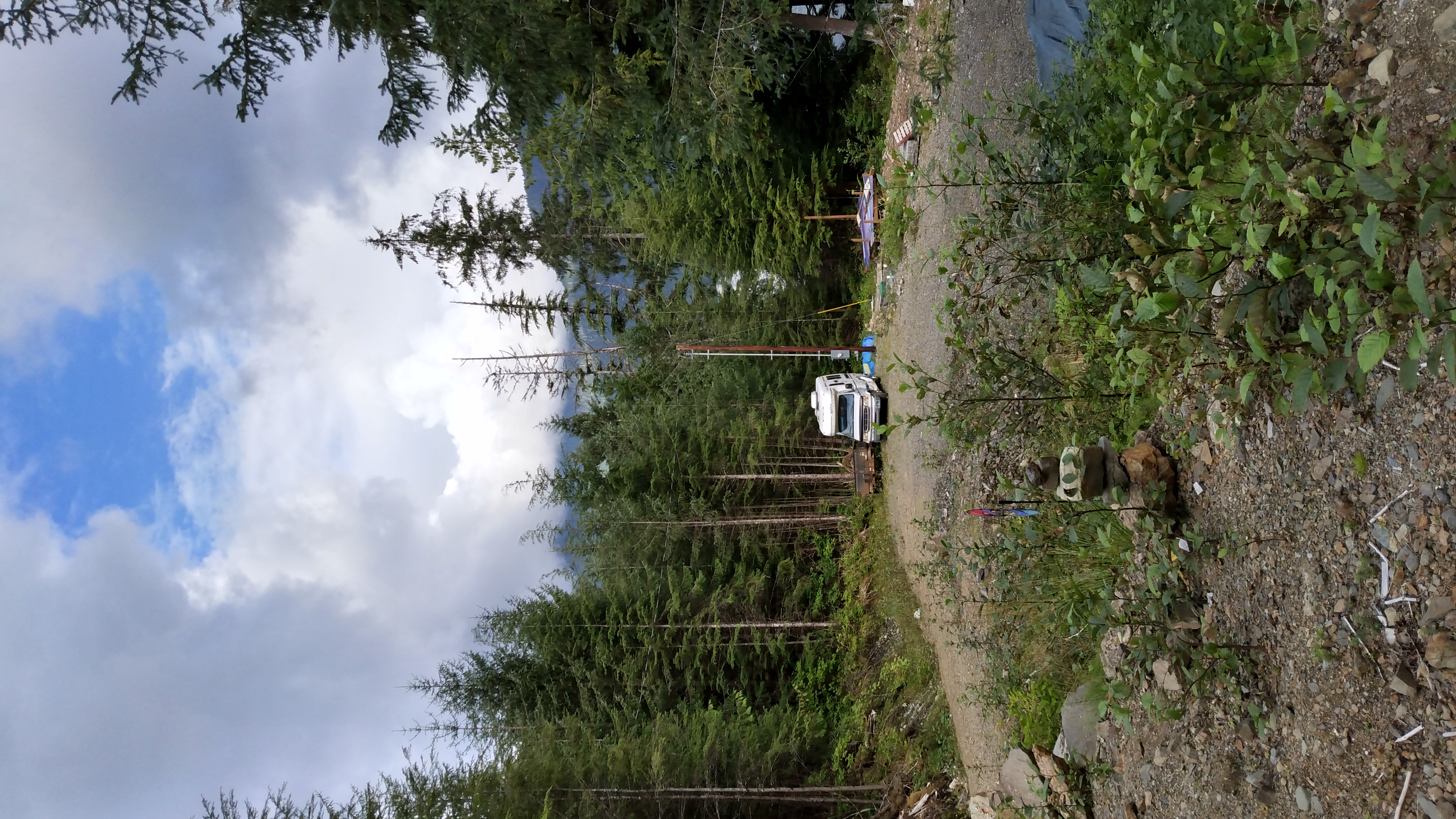
More and more frequently, Art asks me for help with his computer problems. This is very hard for me. Art is and always has been a loyal Apple customer – his computers are all, always, only MacBooks. I hate Apple systems and OS design with a passion, and it’s always been challenging for me to even accept that he sees it differently. But even getting past that, I have to deal with the fact I really don’t know much about how they’re supposed to work. Add to that the fact that Arthur has his own idiosyncratic ways he thinks things should be done, and I really simply can never, ever please him at all.
Case in point: the other day he received in the mail from Amazon two large SSD external drives he’d ordered. He has a huge stockpile of saved stuff on his computers and hard drives, and he needed more storage (though arguably this is mostly because he doesn’t remember how to “clean house” on his computers anymore). Well he got these hard drives and couldn’t get either of them to work. I took a look at them. They were clearly labeled “for Windows.” Now it’s true that often these type of external drives are cross-functional, but I wondered how he’d managed to order them. You can’t really assume they’re cross-functional.
I told him I’d take a look at them on my computers. First I tried on my Linux machines, but no luck. So I booted up my rarely-used Windows partition, and pretty soon I had both of them working. I had to create partition tables – apparently they shipped without them, but expected Windows to attach to them and create the partition tables, or something like that. Once that was done, I could create partitions on each one and format them. I took them back downstairs and Arthur plugged them into his MacBook and sure enough, they were read fine, now.
Rather than thank me, Arthur complained that they drives weren’t displaying the way that he was used to, in his Mac OS finder tool. He considered this unacceptable – but it’s just a different display – the drives are not functionally different. I suspect they display differently because they’re still Windows formatted (NTFS), rather than generic (FAT32) or Mac format.
ㅁ My uncle's not good company, he's really getting old. The room he's in is loud and hot, because he's deaf and cold.
This tree waited while the dog waited at the top of the ramp to the dock.
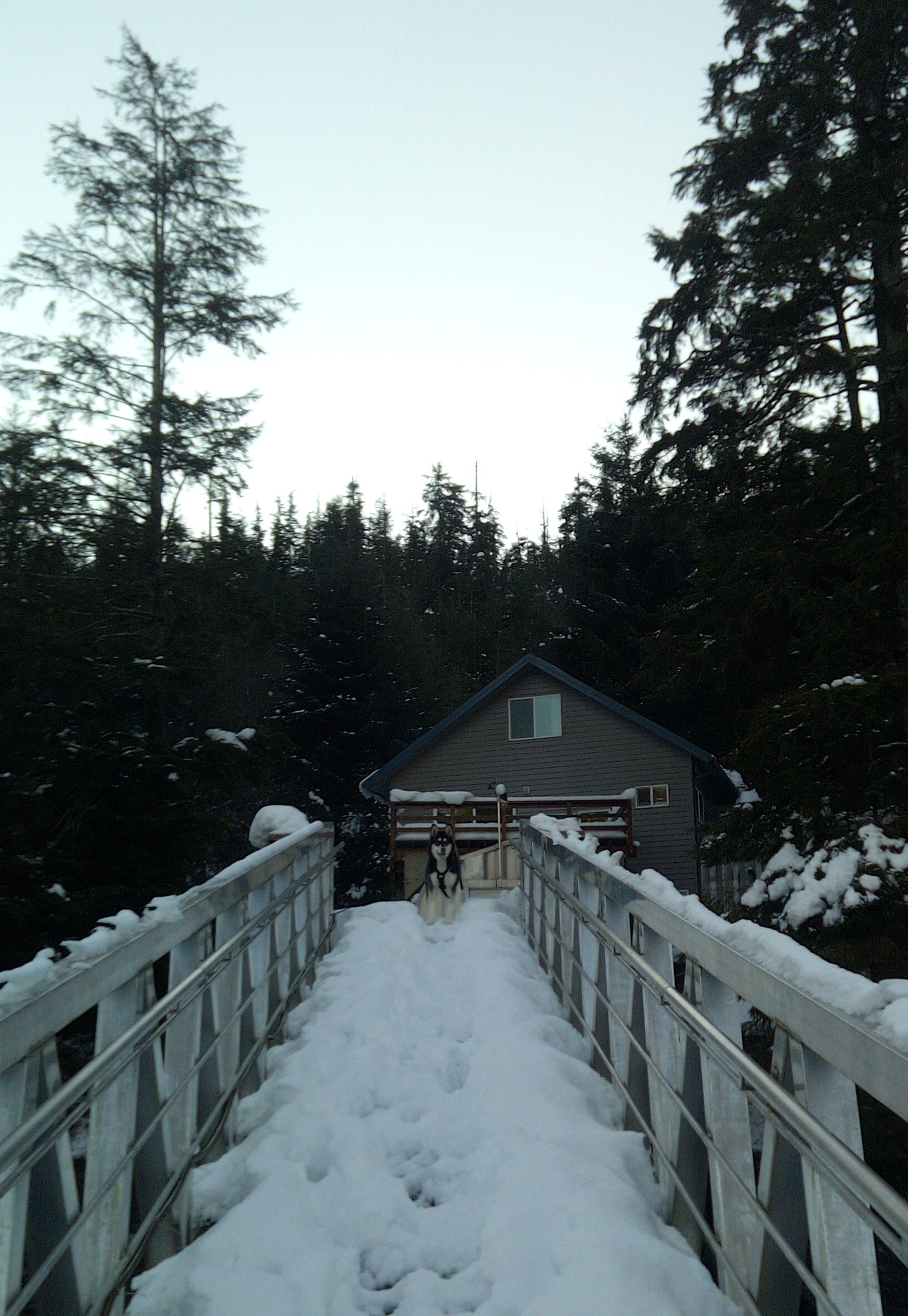
We had a Christmas that was so low-key that it really wasn’t very christmassy at all. I made fish curry for dinner.


“Conlanging” is the accepted name for the hobby of inventing new languages. I have been a conlanger since around age 7 – I remember inventing a language for my stuffed animals – specifically, a tribe of stuffed raccoons – at around that age, and though I don’t have my notes, I remember it being fairly sophisticated for something created at that age.
Like many conlangers, it’s only ever been a kind of side hobby, for me – though it dovetails nicely with another hobby I used to have as a child and that I resurrected in my post-cancer years and that has actually become a major avocation: geofiction. And of course, like many conlangers, I was, as a young adult, drawn to linguistics, where it eventually became one of my undergrad majors at the Univ of Minnesota. I don’t regret that, at all.
Anyway, this post is about conlanging, not geofiction. For some years now, there have existed some interesting websites and computer applications for inventing languages and storing the data. But I found a site yesterday that takes it to a new level. The site is called vulgarlang.com. I actually rather dislike the name, but I think it’s probably good marketing. Anyway, the site is created by people who clearly are quite knowledgeable on matters linguistic – to a level I’ve never seen before. I went ahead and paid the $25 “lifetime” access – we’ll see how that pans out, as I’ve seen many a website offering those terms that lasts 5-10 years before disappearing or radically altering its business model such that the guarantee doesn’t eventuate. But anyway, how could I resist. Let there be more conlanging, then – at a higher level of quality than ever before.
As an incidental, I haven’t posted much of my conlanging work online, at all, but a very incomplete exemplar can be found in this article about the Mahhalian language, which I created about 6 years ago originally.
![]()
We went fishing today. It was an inauspicious start: Arthur slept in and I found the motor wouldn’t start. The battery was dead. I suspect this is because the newly installed plug for the downrigger spent time submersed in standing water – there is no master turn-off switch for the downrigger wiring – this has always been true. We need to remember to make sure the wiring tails with the plug-in ends on them are raised up and unable to fall into water.
We charged up the battery using the battery charger and the long extension cord. We got the motor started at around 8, and by 8:30 we had finally departed the dock.
The inauspiciousness continued, as we trolled without result up and down (or rather, down and up) San Ignacio Island. We crossed over to just west of Tranquil Point. And within half an hour, we caught one. At least we were sticking to our established pattern. We trolled for another hour eastward, until just off Batan Point, northwest of Caldera Bay, we caught two at once – one on each downrigger.
So we spun around and trolled through the same spot again. And we caught two more. This was more auspicious. We trolled through the same spot 3 more times, and caught two more. It was raining fairly steadily and Arthur was feeling overwhelmed by all the cutting and packing ahead of him, so we decided 7 was enough, and headed home. We tied up at the dock at about 3:10.
Year-to-date totals:
ㅁ A deer walked by on the road. Then another passed, and slowed. And the dawning gray sky glowed.
I am experimenting with a new little feature on the right-hand column of this here blog thingy™: random posts from the whole set of past blogposts.

The neighbor, whose house burned down in August, apparently got some insurance money, and is rebuilding. He’s hired someone to put in an improved driveway and a new house-pad, higher than the old house. I’m a bit skeptical in the way this new project has overflowed onto the tribal lands to his east – his new driveway cuts off from the road almost a 100 feet east of his property line. But the new driveway does afford a nice view of the charred but still-living tree down by the water-line where the old house was.
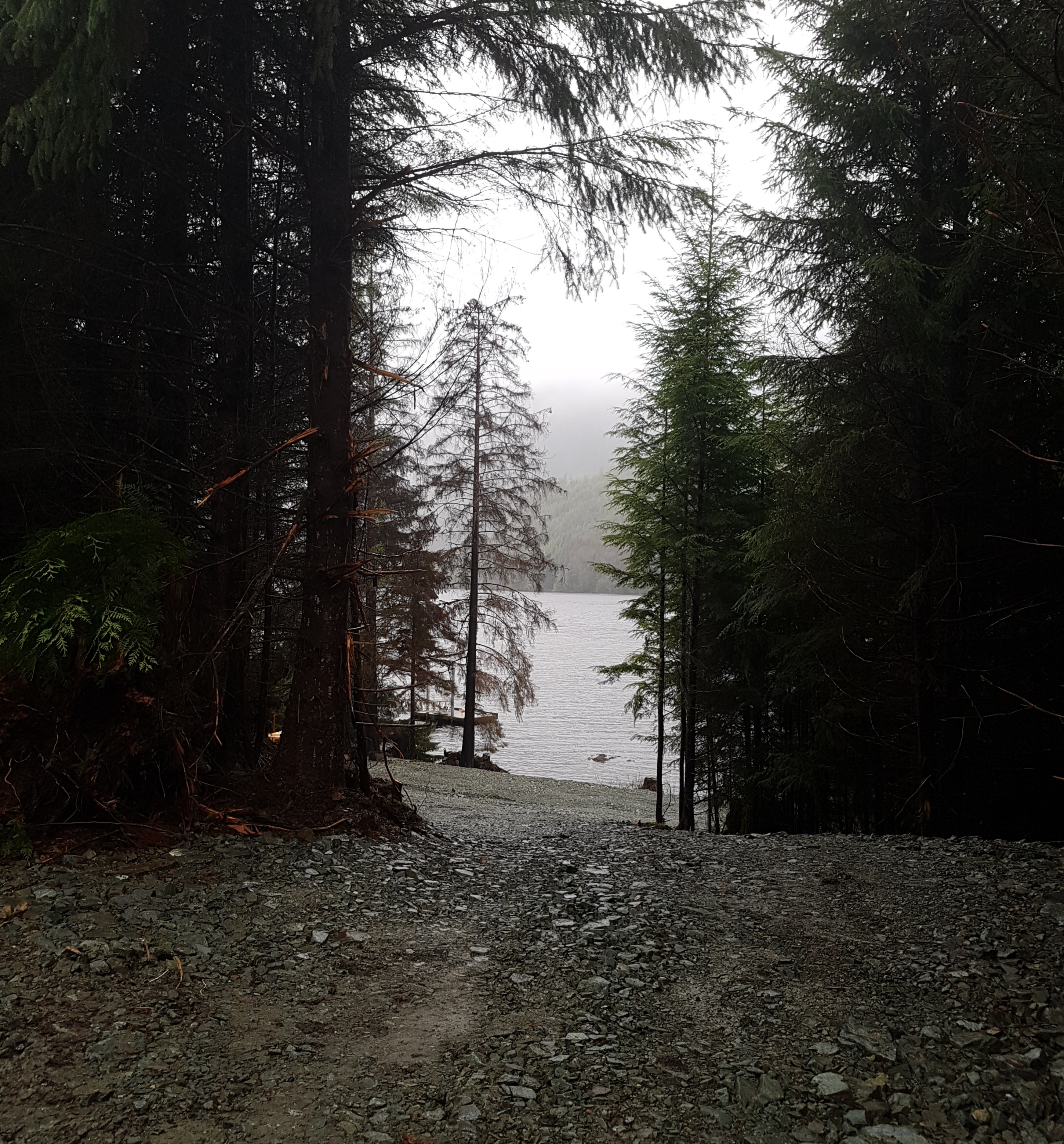
Here is a view of the new house-pad down the old stairs, the lower part of which we had to destroy with the chain saw during the night of the fire, to prevent the fire from spreading up the stairs.
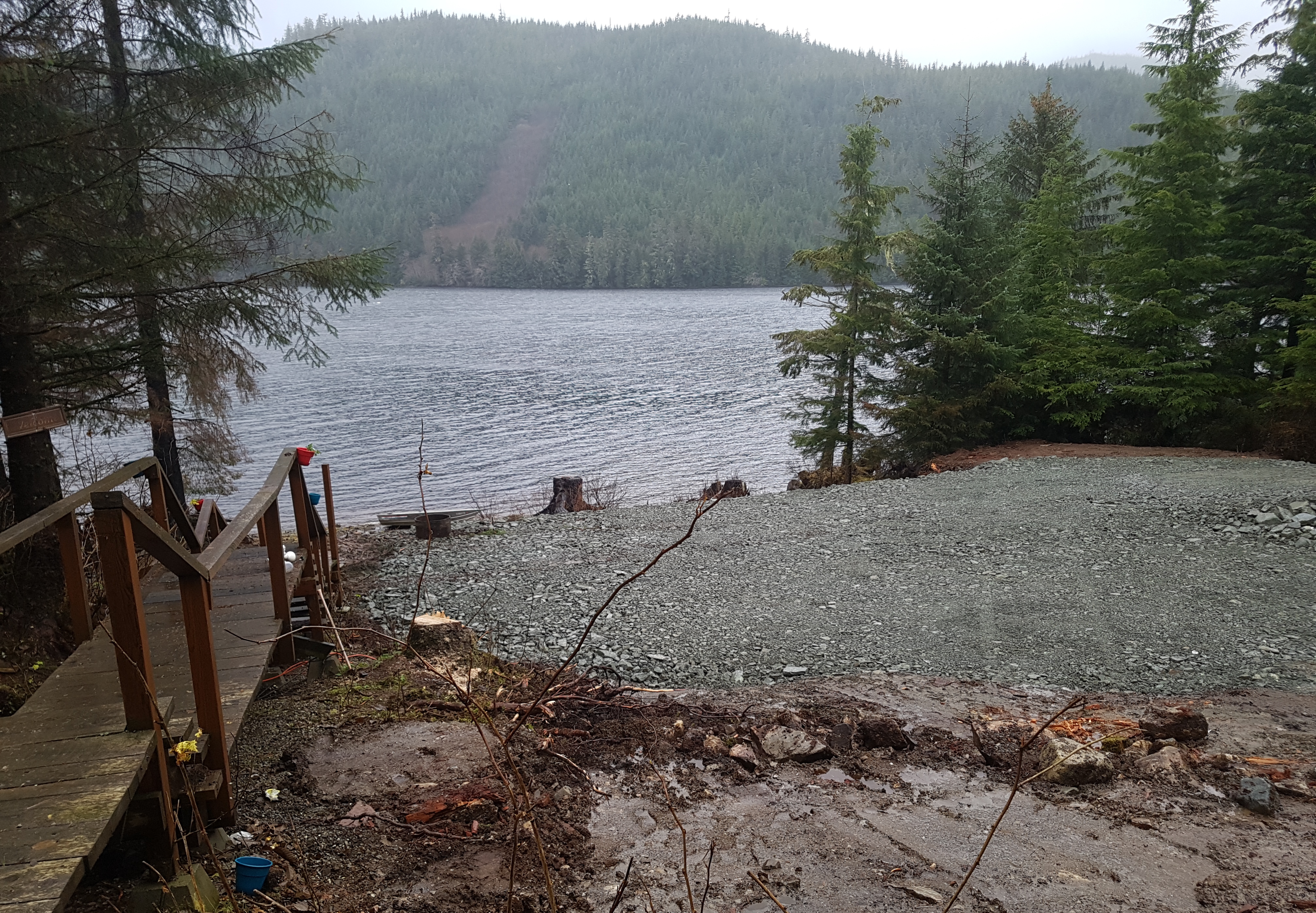
![]() [daily log: walking, 2.5km]
[daily log: walking, 2.5km]
[This is a cross-post from my other blog (see previous blog entry)]
Here’s a live leaflet of my own tileserver with my own planet (stripped of detail because I want my database small as I test things). Welcome to Rahet. UPDATE, OCTOBER 2019: Being a dynamic window on the map, rather than a snapshot, means that since the “planet” shown is much changed, this view is not the view that existed when this blog post was written.
Here’s a view of Tárrases over at OGF on standard layer.
Here’s a view of Tárrases over at OGF on Topo layer. [UPDATE 20210530: The OGF Topo layer is no longer functioning.] [UPDATE2 20230315: The OGF Topo layer is once again functioning, and has been for over a year.]
That’s pretty cool.
Music to map by: Cold, “Bleed.”
Listening files links!
HS2
HtMSftTOEFL Intermediate
Speaking
Writing
Listening
HS3
TEPS
Korean
말하기 쉬운 한국어 2
Other
[UPDATE 2018-02-09: This page was created in 2013, and I have not updated it. I am putting it here because I have closed the site where it was originally hosted. Most of it is still broadly accurate.]
My name is Jared Way. I have created this website for interacting with my current students, as well as to present myself professionally. I also maintain a personal blog if you want to see more about me.
Brief Background
In 2007, I returned to teaching after working for many years in information technology (database programming and business systems analysis). I had worked as a high school teacher in the United States in the 1990’s.
I came to South Korea and I worked for several hagwon (after-school academies) in Ilsan (Goyang City), Gyeonggi, South Korea, from September, 2007, until August, 2009. In April of 2010, I started a one-year contract at Hongnong Elementary School in Hongnong, Yeonggwang County, Jeollanam, South Korea. This was a rural, public school. After that contract ended (April, 2011), I returned to Ilsan and have been another hagwon there since then until the present (January, 2013).
In most of my positions I have worked as speaking or listening skills teacher, with a focus on iBT (TOEFL) preparation or debate-based curricula. I find that debate, especially, is an excellent way to teach integrated languages skills to Korean students, regardless of level or age.
Personal Data
South Korea has a distinct culture and it is extremely common for people I barely know or have just met to ask me questions that would be considered rude or “too personal” in an American cultural context. I think just putting this information online for people to see is easiest.
Why Korea?
At some point a some years ago, I became fascinated with Korean language and culture. I have a background in linguistics, and the Korean language is both fascinating to me but also intensely challenging. I have decided that I welcome this challenge, and although it may take a very long time, I hope to stay in Korea until I feel I have reached some degree of competency with the Korean Language. That is one of the reasons why I choose Korea instead of some other location to pursue my teaching career.
Nevertheless, for me the teaching work is more important than the language study, which is perhaps why, after five years in Korea, I’m continue to struggle with the language at a fairly low level – it is often hard to find time and opportunities to study and practice effectively.
I have grown very fond of Korea and Korean culture.
Additional Materials
Below is a list of other materials I have made available online [UPDATE 2018-02-09: all links are broken!].
I needed a place to “stockpile” video links of songs I think have some teaching potential or entertainment value for my students.
They Might Be Giants, “Walking My Cat Named Dog.” Originally by Norma Tenaga, 1966.
Lyrics
I’m walkin all around the town
Singin all the people down
Talkin around, talkin around.
Me and my cat named Dog
Are walkin high against the fog
Singin the sun
Singin the sun
Happy, sad and crazy wonder
Chokin up my mind with perpetual dreamin…
I’m driftin up and down the street
Searchin for the sound of people
Swingin their feet, swingin their feet
Dog is a good old cat
People what you think of that?
That’s where I’m at, that’s where I’m at.
Happy, sad and crazy wonder
Chokin up my mind with perpetual dreamin…
Dog is a good old cat
People what you think of that?
That’s where I’m at, that’s where I’m at, that’s where I’m at.
They Might Be Giants, “Elephants.”
Lyrics
they’re not the largest mammals
but they’re biggest on the land
so when I say “please step away”
I know you’ll understand
they’ve got two tusks up front for fighting
or digging in the dirt
so you can see how easily
you’d end up getting hurt
2x
get out of the way
get out of the way
the elephants are coming through your town today
they’re great communicators
with waves called infrasound
seismically clear – you’d barely hear
them travel through the ground
and while the cows all stick together
and congregate at home
the bulls go out and walk about
they’d rather be alone
2x
get out of the way
get out of the way
the elephants are coming through your house today
did you hear about the farmer…
They Might Be Giants, “Omnicorn.”
Lyrics
omnicorn. like no other creature ever born
on its head is every manner of horn
the omnicorn’s the one
the one
omnicorn
omnicorn
omnicorn. hiding over by the edge of the pines
now it’s running past the hunting lodge sign
no one will see it go
I’ve been to museums
I’ve seen the no-see-ums
I know what I’m talking about
omnicorn. even rarer than a unicorn
it’s got every single kind of horn
omnicorn’s the one
the one
omnicorn
omnicorn
omnicorn. leaping over someone’s mobius strip
left behind from a vacationing trip
that’s something to talk about
omnicorn go
omnicorn go
omnicorn go
omnicorn go
Lyrics.
Color Song
What color is the sky?
It’s blue.
It’s blue.
It’s blue.
The sky is blue.
The sky is blue.
What color is the sun?
It’s yellow.
It’s yellow.
It’s yellow.
The sun is yellow.
The sky is blue.
What color is the grass?
It’s green.
It’s green.
It’s green.
The grass is green.
The sun is yellow.
The sky is blue.
What color is an apple?
It’s red.
It’s red.
It’s red.
An apple is red.
The grass is green.
The sun is yellow.
The sky is blue.
The sky is blue.
xx
xx
xx
This is a list of Korean phonomimes, phenomimes and psychomimes. In Korean, phonomimes are called 의성어, while phenomimes and psychomimes (without distinction) are called 의태어.
Most are reduplicative, but not all, cf. 날씬. Most are adverbial, but not all, cf. 똑똑하다 which is only allowed with the verbal suffix -하다 (there exists an adverbial 똑똑 but the semantics are completely different, as it seems be simply a phonomime “knock knock”). Many of them show variants with an alternation of vowels (mostly within the old Korean vowel harmonies). Most of them appear to derive from “native Korean” (pre-Chinese substrate) but a few have hanja (i.e. are borrowed from Chinese, e.g. 당당하다) – these might not belong, strictly speaking, to the same category but I have included them anyway because the semanto-phonotactics are the same.
There are quite a few, and I have posted [broken link! FIXME] several [broken link! FIXME] blog [broken link! FIXME] entries about them in the past, but I have decided to maintain a simple consolidated list as a separate page, as I have never found one online that exactly presents them in just this way, as a simple list.
The distinction between them is quite vague and unclear. When does a phonomime become a phenomime? When does a phenomime shade into a psychomime? I don’t know that such distinctions are even useful – one can use a phonomime metaphorically to pass into the other semantic categories. What’s interesting to me is their existence as a broad and seemingly fairly active semantic category, collectively.
Actually, the relation in wikipedia between the articles on “ideophone” and on “sound symbolism” (which includes discussion of phenomimes and psychomimes) overlaps substantially, without either article seeming to be aware of the other. In fact, there is other work in other places, too, that doesn’t tie this together very well. In general, the “internet’s” understanding of this phenomenon seems quite fragmented and poor. This is another motivation for posting this updatable “page” on my blog space.
Personally, I’m not sure what to call these, collectively. “‘Mimes”? “Reduplicative adverbials”? “Sound symbolic sememes”? I’ve seen the term “mimetic words.” I think I like “ideophone.”
So here is a list, in 한글순서 (Korean “alphabetical” order) – roughly, I haven’t worked too hard to make sure the vowels under each consonant are in correct order.
[last updated 2015-10-09]
testing. . .
This quote is the closest thing I have to a guiding principle. It is succinct but philosophically profound and has layers of complexity. It summarizes Deleuze’s ethical thought, in the context of his work on Spinoza.
Here is a compilation of other quotes I like.
I’m a “faith-based atheist.”
What in the world is that?
It means that, unlike an agnostic, I’m certain about god: specifically, that there isn’t one. But such certainty isn’t something that submits to any kind of objective proof: just as the religious person must accept the existence of his or her god(s) as a matter of faith, so must the true atheist rely on belief over material evidence – after all, how do you prove god doesn’t exist? Anything short of this standard-of-proof makes one an agnostic, not an atheist.
What’s still more difficult, is to strive for an ethical existence when the most commonly invoked “cause” (or source) of human ethics (namely, the alleged “higher powers”) have been unequivocally rejected. It seems to me that the only ethical atheist is one who accepts that his or her belief is indeed just that – a belief, not a demonstrated “fact.”
Atheists who assert some kind of exceptionalism for their own beliefs vis-a-vis the beliefs of non-atheists strike me as hypocritical. I’m profoundly uncomfortable with many atheists – of the secular-humanist stripe – who attempt to position themselves as rationalists – I think it’s not only philosophically perilous but ultimately unethical due to this inherent hypocrisy.
Despite this, I’m also displeased with the tendency of humanists (again, i.e. “secular humanists”) to categorically place human beings in the center of things. Such pre- (or even anti-) Copernican posturing is just as irrational as the traditional, god-centered systems they presume to criticize – in my judgement, anyway.
With the categorical rejection of the transcendental and god-centric, I believe that there must come a similarly vehement rejection of the anthropocentric. So… but what’s left, then?
Let me get back to you on that one. Does this make me sound like a nihilist? This is a possibility. I’m most comfortable with a sort of aesthetic take on the whole matter, a la Robinson Jeffers Inhumanism. But that doesn’t really resolve the epistemological issues – which are what seem to most interest me.
Another issue is how I can reconcile my committed atheism with my frequent self-description as a “Buddhist.” However, one has to understand that Buddhism, in most conceptions, is doctrinally agnostic with respect to the theist question. To attempt to paraphrase Gautama Siddhartha, as I have understood it: when asked about the existence of deities or God, he reportedly answered that, like everything else, it was both true and not true. Thus there is room within Buddhism for both atheists and theists, as well as whatever falls in between.
[Last updated 2015-10-08]
Lately, because of facebook, I’ve been “reconnecting” with people I haven’t interacted with or known about for up to 25 years. People from high school! Jeannine, Kray, Richard…. People from elementary school! Tammy. People from the Mexico City time! Aura, Vlady.
Anyway, questions crop up: Didn’t you go to university in Missouri? (No, it was Minnesota). I heard you joined the Army? (Yes). Is it true you were married? (Yes). And then you got divorced? (Um, not exactly – separated-then-widowed).
Being a fundamentally lazy person, I have decided to answer a whole pile of these questions at once. I’ve created a year-by-year timeline of my life-since-high-school. Each year has 2 to 6 telegraphic sentences summarizing what I recall as the salient aspects of that year.
I can now point interested people to it – if they’re interested. More me out there, for all the world to see: I believe in transparency – it cleanses the soul.
[UPDATE 2021-05-20: While doing some link-rot maintenance, it came to my attention that I posted almost exactly this blog-post 2 years before, here. Anyway, the below timeline is out-of-date by about a decade, now, and it’s long been superceded by my Year-In-Six-Sentences category.]
Timeline
Below are some past works that I’m sufficiently happy with to share them, in a smallish format.
Above: Azul, 1992
Above: Abstract, 1993
Above: Kitchen, 1991
Above: Lines, 1988
Above: Motion, 1988
Above: Mujer, 1993 (this is actually Michelle)
Above: Old Man, 1993
Above: Sancho Panza, 2006
Above: Way Family Home (San Marino, CA), 1991
Above: Self-Portrait From Photograph at Age 5, 1999
Above: Icon, 1995
These are the grammar points from the first two volumes of the Korean language textbook I was using in February and March, 2010. Given that I finished the courses, I should, in theory, know all this grammar perfectly. So much for theory.
미친
외국인의 문법 – Things from the textbook, that I
should already know
1.01.1
종결
어미 (terminative inflections), formal register
declarative: Vc+습니다
/ Vv+ㅂ니다
interrogative: Vc+습니까
/ Vv+ㅂ니까
imperative: Vc+으십시오
/ Vv+십시오
propositive: Vc+읍시다
/ Vv+ㅂ시다
1.01.2
honorific V-stem infix (precedes most
other affixes): Vc+으시+
/ Vv+시+
1.02.1
“how” Adv: 어떻게
1.02.2
“too, also” topicalizing N
suffix particle (follows most other affixes): N+도
1.03.1
“the, as for…, speaking of…”
topicalizing N suffix particle (follows most other affixes): Nc+은
/ Nv+는
1.03.2
predicate affirmative suffix / copula,
“be”: N+이다
(this makes a noun “N” into a
conjugable predicate [verb] “to be N”)
1.03.3
deferential 1st person sing. pronoun,
“I”: 저
1.03.4
contraction “my”: 제
<= 저의
(deferential “I” + genitive case particle)
1.04.1
demonstrative prefixes
“this”: 이+N
“that [near listener]”: 그+N
“that [over there]”): 저+N
1.04.2
“who”: 누구
(note obligatory contraction 누가
<= *누구가)
1.04.3
“we”: 우리
(note that this word often doesn’t seem to accept case
particles)
1.05.1
demonstrative pronouns (derived from
demonstrative prefixes + 것
“thing”)
“this”: 이것
“that [near listener]”: 그것
“that [over there]”): 저것
1.05.2
subject case particle: Nc+이
/ Nv+가
1.05.3
interrogative pronoun, “what
[thing]”: 무엇
1.05.4
object case particle: Nc+을
/ Nv+를
1.06.1
note that +도
(1.2.2) “overwrites” subject and object (an
perhaps others?) case particles
1.07.1
“where”: 어디
1.07.2
dative case particle “to [action
verbs toward a place], at [a time], in [stative verbs in a place]”:
N+에
1.07.3
locative case particle “at [a
place], from [a place], in [action verbs in a place]”: N+에서
1.08.1
“when”: 언제
1.08.2
past/perfective finite verb infix
(invokes vowel harmony with verb stem): V+{았/었/였}+
(and note common contractions [some
mostly obligatory, with asterisk]:
했
<= 하였,
봤 <=
*보았,
배웠 <=
*배우었,
etc.)
1.08.3
숫자
(numerals, chinese origin)
(used for money, minutes, dates,
months, calendar years, phone numbers, addresses, etc.)
1.09.1
predicate negative suffix / copula,
“not be”: Nc+이
아니다 / Nv+가
아니다
(this makes a noun “N” into a
conjugable predicate [verb] “not to be N”)
1.09.2
“which”: 어느
1.10.1
non-finite verb oppositional suffix,
“but, however”: V+지만
1.11.1
1.12.1
1.13.1
1.14.1
1.15.1
1.16.1
1.17.1
1.18.1
1.19.1
1.20.1
1.21.1
1.22.1
1.23.1
1.24.1
1.25.1
2.01.1
2.02.1
2.03.1
2.04.1
2.05.1
2.06.1
2.07.1
2.08.1
2.09.1
2.10.1
2.11.1
2.12.1
2.13.1
2.14.1
2.15.1
2.16.1
2.17.1
2.18.1
2.19.1
2.20.1
2.21.1
2.22.1
2.23.1
2.24.1
2.25.1
2.26.1
2.27.1
2.28.1
2.29.1
2.30.1